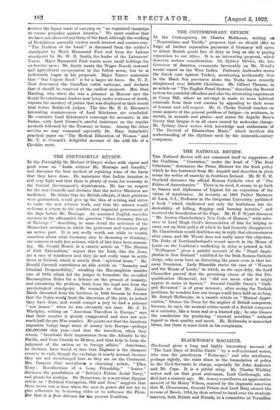THE NATIONAL REVIEW.
Tan National Review will not commend itself to supporters of the Coalition. "Centurion," under the head of "The Real Criminals," denounces the Prime Minister for the Irish policy which he has borrowed from Mr. Asquith and describes in plain terms the welter of anarchy in Southern Ireland. Mr. H. E. M. Stutfield discusses the official Roman Catholic view of "The Ethics of Assassination." There is no need, it seems, to go back to Suarez and Alphonsus of Liguori for an exposition of the virtue of intolerance. As recently as 1901 Father Marianus de Luca, S.J., Professor in the Gregorian University, published a book "which vindicated not only the lawfulness but the desirability of killing, flogging and burning heretics," and received the benediction of the Pope. Mr. H. F. Wyatt discusses "Mr. Austen Chamberlain's New Code of Honour," with refer- ence to Lord Hugh Cecil's denunciation of him for helping to carry out an Irish policy of which he had formerly disapproved. Mr. Chamberlain would doubtless say in reply that circumstances alter cases, and Mr. Wyatt does not really meet this objection. The Duke of Northumberland's recent speech in the House of Lords on the Coalition's trafficking in titles is printed in full. " Wellington " gives a painful account of the "Papal Anglo- phobia in New Zealand" exhibited by the Irish Roman Catholic clergy, who seem bent on disturbing the peace even in that far- away Dominion. Lady Rhondda states the case of "Women and the House of Lords," in which, as she says drily, the Lord Chancellor proved that the governing clause of the Sex Dis- qualification (Removal) Act "did not mean what it might appear to mean to laymen." General Cunfiffe Owen's " Galli- poli Revisited" is of great interest ; after seeing the Turkish positions, he wonders how our troops could have held on so long. Mr. Joseph Holbrooke, in a caustic article on "Musical Appre- ciation," blames the Press for the neglect of British composers, because, he says, the musical critics speak of a British composer as a curiosity, like a tame seal or a learned pig ; he also blames the conductors for producing "musical novelties" without regard to their quality and merit. Mr. Holbrook° is somewhat. bitter, but there is some truth in his complaints.


































 Previous page
Previous page